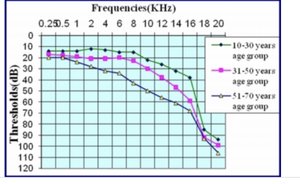Hey Guys,
A question on audiograms.
I had another one done yesterday as part of my routine to check on my ears - and all was normal (slightly better) than the one two years ago. So other than having to listen for the "warble" through a head of hissing tinnitus, I was happy.
I had an interesting discussion with the audiologist (which she initiated) on why I have tinnitus with no significant hearing loss.
She said that conventional hearing tests only test up to 8khz (I know this, and I've had an extended one done a little while ago), they only measure intervals. So in between these intervals, there could be a dip at a certain frequency which is responsible for our tinnitus (as well as frequencies above 8khz).
She said you can get audiograms done that test more of the frequencies (they obviously take longer), which might expose where exactly a loss might sit.
Now I haven't really cared to educate myself too much on hearing tests and losses, rather focusing on tinnitus and how I can lessen that burden on myself.
Does anyone have any feedback on this? Even if we are told we have no losses in the speech range, this is only in the frequencies tested and won't expose anything that lies in between?
Thanks Guys!
Samantha.
A question on audiograms.
I had another one done yesterday as part of my routine to check on my ears - and all was normal (slightly better) than the one two years ago. So other than having to listen for the "warble" through a head of hissing tinnitus, I was happy.
I had an interesting discussion with the audiologist (which she initiated) on why I have tinnitus with no significant hearing loss.
She said that conventional hearing tests only test up to 8khz (I know this, and I've had an extended one done a little while ago), they only measure intervals. So in between these intervals, there could be a dip at a certain frequency which is responsible for our tinnitus (as well as frequencies above 8khz).
She said you can get audiograms done that test more of the frequencies (they obviously take longer), which might expose where exactly a loss might sit.
Now I haven't really cared to educate myself too much on hearing tests and losses, rather focusing on tinnitus and how I can lessen that burden on myself.
Does anyone have any feedback on this? Even if we are told we have no losses in the speech range, this is only in the frequencies tested and won't expose anything that lies in between?
Thanks Guys!
Samantha.

 Member
Member it is I'm sorry.
it is I'm sorry.